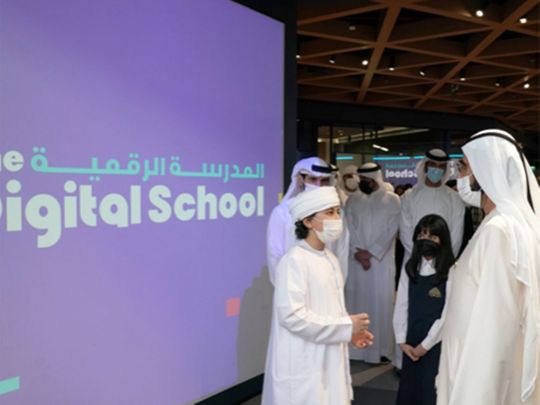Dubai: A digital school that will boost online education in the Arab region and introduce a new learning experience globally, especially for refugees and less fortunate children, was launched by the Mohammed bin Rashid Al Maktoum Global Initiatives (MBRGI) on Wednesday.
His Highness Sheikh Mohammed bin Rashid Al Maktoum, Vice President and Prime Minister of the UAE and Ruler of Dubai, also tweeted on Wednesday: “We launched the Digital School (digitalschool.org) to provide accredited online education to students wherever they are. The School will seek digital learning accreditation with global bodies. Our initial trial phase starts with 20,000 students and we aim to reach one million students by 2026.”
“There are millions of children across the world with no access to education due to war and conflict. If we didn’t try to address this knowledge gap, we will fail to give our future generations a healthy environment to grow up in and contribute to their societies,” Sheikh Mohammed added.
International collaboration
The Digital School was developed after extensive research and review of leading global learning experiences on how to implement a comprehensive advanced digital learning ecosystem and drive new educational technologies.
MBRGI has collaborated with educational experts and specialists from leading global universities, including Harvard University, Stanford University and New York University, to build the online education platform.
Powered by advanced learning technologies, the Digital School will “offer a flexible and personalised approach to knowledge and skill development. It will provide equal access to high quality education to students all over the world, particularly targeting refugees and disadvantaged students in the Arab world.”
“The pilot phase of Digital School – which will run until September 2021 – will target 20,000 students and the goal is to reach one million students from disadvantaged groups across the world in the next five years or from 2021 until 2026,” Dr. Jan Plass, Paulette Goddard Chair in Digital Media and Learning Sciences at New York University, told Gulf News during the media launch.
The Digital School will lay the foundations and standards for digital education in the region and the world by offering accredited curriculum to students at various educational levels, nurturing skills beyond academic competency to self-learning skills, Social and Emotional Learning (SEL) and innovation.
Alliance for the Future of Digital Learning
As part of the Digital School, the first-of-its-kind ‘Alliance for the Future of Digital Learning’ was also launched to unify efforts to advance the future digital education systems in the region and the world.
The Alliance will support and develop the Digital School’s implementation across different stages to facilitate education to students across the world, particularly students living in refugee camps and marginalised communities.
The Alliance will work on implementing modern digital learning practices and setting future digital education frameworks in the region. It will also establish an education system based on practical applications and developing pilot projects that cater to different needs in the region and the world.
The Alliance is supported by local humanitarian organisations, including Dubai Cares and the Emirates Red Crescent, as well as experts from tech and telecommunications companies.
Bridging the gap in education
Chris Dede, the Timothy E. Wirth Professor in Learning Technologies at at Harvard’s Graduate School of Education (HGSE) and a member of the Alliance Advisory Council, noted: “Digital education will help bridge the gap between the current educational system and the modern labour force, especially as COVID-19 pandemic highlighted the rising challenges in the learning ecosystem.”
“Typical classrooms at every level are now dominated by one-size-fits-all presentational instruction appropriate for an industrial society, but not the emerging global digital economy. In the shadow of the pandemic, the Alliance is seizing the opportunity to develop and scale learning environments based on advanced technologies and modern knowledge about the mind and brain,” he added.
He elaborated: “Students need strengths in resilience, perseverance, self-regulation, collaboration, conflict resolution, and forging opportunity from turbulence and uncertainty. (The Digital School) will develop knowledge, skills, and dispositions to face the next half century.”
Dr. Paul Kim, Chief Technology Officer and Associate Dean of the Graduate School of Education at Stanford University, added: “The Digital School is a visionary and ambitious project in the field of education that will bring real change to lives across the region and indeed the world. It is fitting that this project is coming out of Dubai.”

